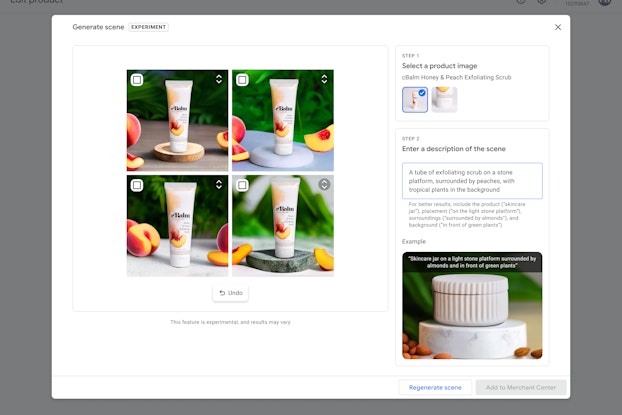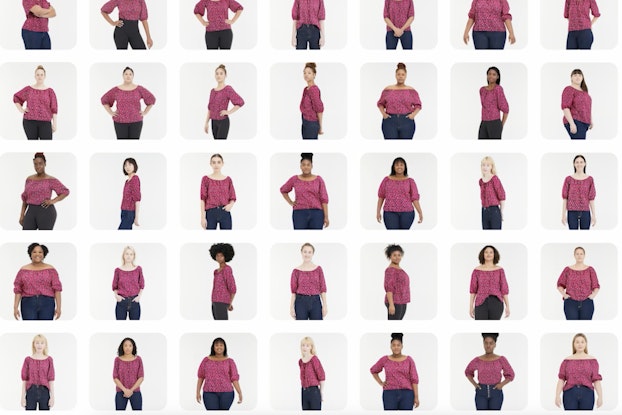
How Google’s new generative AI tools aim to help small businesses sell online:
- Google, with 35 billion global product listings on the search engine, set out to mitigate the pain points SMBs businesses face when selling online via generative AI, which produces original content from just a key phrase or brief description prompted by a human.
- AI-fueled enhancements include Product Studio, which helps marketers produce unique product imagery and text, a big expense, at zero cost; and a new natural language conversational experience in the Google Ads platform that suggests relevant keywords, headlines, and descriptions for businesses to integrate into their campaigns.
- Google’s new virtual try-on tool lets consumers view clothing — one of the most shopped for categories on the web — on human models that mirror their shape, in a bid to reduce the steep cost SMBs incur for clothing returns.
Google wants to help small businesses create spot-on marketing copy and ad-agency quality product shoots for free — and in minutes — via the magic of generative artificial intelligence (AI).
The tech giant aims to help level the playing field between big companies and small businesses via the buzzy technology, which produces original content, be it text or imagery, from just a key phrase or brief description prompted by a human.
The idea is to boost consumer product discovery and mitigate the chronic and costly pain points SMBs businesses face when selling online.
AI-fueled enhancements set to roll out this year include Product Studio, which helps marketers produce unique product imagery and text, a big expense, at zero cost.
Live now is Google’s new virtual try-on tool, which lets consumers view clothing — one of the most shopped for categories on the web — on AI models that mirror their shape, in a bid to reduce the steep cost SMBs incur for clothing returns.
The tools mark the relaunch of Merchant Center, where businesses manage their listings on the site, updated to add newfound value to Google’s shopping ecosystem and, presumably, help small businesses scale, executives said during a launch event at its New York City headquarters.
And a vast shopping ecosystem it is: While Google doesn’t disclose the number of businesses that list on the site, it boasts 35 billion global product listings and counting, just as the number of businesses using its Merchant Center has doubled in the past two years.
While big-tech cohorts like Microsoft are increasingly launching generative AI tools for small businesses just as buzzy AI platform ChatGPT empowers companies to whip up marketing campaigns that would typically take hours in mere minutes for free, SMBs that list on Google who already have exposure via its local business search tool and Google Maps can plug into a search engine where generative-AI shopping enhancements are now “baked in,” Jacob Bourne, Analyst for Connectivity and Tech Briefings with Insider Intelligence, told CO—. The question is not, ‘What businesses are on Google,’ but, ‘Who’s not listing on Google already?’”
And just as businesses are already on the site, so are consumers. “A big aspect of Google getting into the commercial generative AI space is its ability to draw upon its massive internet search market lead,” Bourne said. “It commands an estimated 93% of the search market.” Although Amazon commands product search, “Google is a one-stop search outlet for everything.”
One big caveat: “It really has to figure out how to attract a younger demographic, who have been migrating to TikTok for search and shopping, to ensure its longevity,” he said.

‘Empowering businesses of all sizes to quickly and easily create new imagery based on their ever-changing marketing needs’
For all types of businesses, e-commerce listings with eye-candy appeal, equivalent to compelling in-store displays, are table stakes today and key to driving sales.
But although online product listings that feature multiple images garner 76% more impressions and a 32% increase in clicks than single image listings, 40% of product offers on Google feature just a single image, according to the company.
Google’s Product Studio feature addresses businesses’ complaints that creating high-quality lifestyle and product images is time-consuming and expensive.
Leveraging its Scene Generation tool, businesses select a product image, enter a description of a scene, such as “a tube of exfoliating scrub on a stone platform, with tropical plants in the background,” then voila, the tool summons the image of an eBalm Honey & Peach exfoliating scrub, for example. (Pictured.)
“Product Studio empowers businesses of all sizes to quickly and easily create new imagery based on their ever-changing marketing needs, right from where they already manage their presence on Google,” Matt Madrigal, Vice President and General Manager, Merchant Shopping, told CO—.
Businesses can tap Product Studio to create images not just on Google, “but on their owned channels across the web — bringing Google's unique expertise to brands at scale, and helping them grow their business,” he said.
“If you’re a small business looking to hire a team of marketers to create and update product descriptions and images as seasons change, it’s really expensive,” Bourne said. Theoretically, Product Studio democratizes marketing between small businesses and their big-business brethren that have mega budgets to play with, he said.
For SMBs, the feature could also help topple one barrier to scale, as businesses can tap the tool to exponentially generate product listings. “[If] you’re bringing your full suite of products to market faster, that’s going to translate to better sales performance,” Bourne said.
A big aspect of Google getting into the commercial generative AI space is its ability to draw upon its massive internet search market lead,” Bourne said. “It commands an estimated 93% of the search market.Jacob Bourne, Analyst for Connectivity and Tech Briefings, Insider Intelligence
Automating Google ad campaigns and idea generation via generative AI
As a general proposition, businesses find launching ad campaigns overwhelming, Google research revealed.
That’s why the search engine has also introduced a natural language conversational experience within its Google Ads platform that’s designed to catalyze campaign creation by blending Google AI with business owners’ expertise.
Here’s how it works: Businesses can input a landing page from their website and Google AI will scan the page and develop a summary of the content, pulling out key characteristics that a business might want to feature in their campaign. Google AI then churns out relevant keywords, headlines, and descriptions. The idea is that business owners query Google the way they might query a colleague.
Then, businesses can incorporate Google’s AI-generated suggestions into their campaigns. Advertisers have full control over which keywords and assets are ultimately deployed as part of their campaign. The experience, Google hopes, provides advertisers with a more automated and nuanced campaign setup.
For businesses advertising on the search engine now, Google AI “supplements creative idea generation, while keeping the advertiser in the driver’s seat,” Vidhya Srinivasan, Vice President of Search Ads and Ads on Google Experiences, said in a statement.

Google virtual try-on tool looks to chip away at the $816 billion cost of product returns
Google’s new virtual try-on feature for apparel targets that boutique Main Street clothing store that wants to boost the profitability of its online business while reducing product returns. Amid the surge in online shopping, product returns cost U.S. merchants and brands a whopping $816 billion in lost sales last year, according to the National Retail Federation.
By tackling clothing, Google is targeting a common e-commerce purchase that also consistently disappoints shoppers: Indeed, 59% of e-commerce shoppers are dissatisfied with the apparel they’ve bought online because the fit falls short of what they’d envisioned, and 42% of shoppers don’t feel represented by the images of models they’re fed by brands, according to Google research.
Google’s new generative AI model takes a single image of clothing and recreates how that item would drape, fold, cling, stretch and form wrinkles and shadows on a diverse set of real-life models striking various poses, Shyam Sunder, Product Manager for Google, told CO— at the NYC press event.
Google selected people ranging in sizes XXS to 4XL, reflecting different body shapes, ethnicities, skin tones, and hair types. Consumers can instantly find a human model that mirrors their shape and coloring and visualize with higher accuracy how an item will actually look on them, he said. Now “there’s a higher likelihood they’ll buy the product.”
The virtual try-on option is available to all U.S. shoppers in search of women’s tops from big brands like H&M and LOFT, but small brands, too, and therein lies the benefit for SMBs. As small brands can upload a single image and Google will generate multi-shaped models wearing it, the tool saves small businesses on costly product shoots, “while aiding [SMBs] in the consumer discovery of more products and brands,” Sunder said.
Digital try-on solutions that aim to replace the in-store fitting room experience are nothing new. Fashion tech solutions designed to tackle the pain point of buying clothes online have proliferated in recent years, from startups like True Fit that work with a variety of brands to Walmart’s "Choose My Model" digital experience. But the tech has thus far “had lackluster adoption by retailers or consumers,” Sucharita Kodali, Vice President and Principal Analyst for Forrester, told CO—.
But because Google is a dominant destination for shopping searches online, that adoption rate could change, Insider Intelligence’s Bourne said.
“It comes down to the [virtual-try on] features’ performance: Does it work better than competitors? Having a robust lead in AI research, Google has an advantage in providing a pretty robust tool to consumers,” he said.
CO— aims to bring you inspiration from leading respected experts. However, before making any business decision, you should consult a professional who can advise you based on your individual situation.
CO—is committed to helping you start, run and grow your small business. Learn more about the benefits of small business membership in the U.S. Chamber of Commerce, here.









